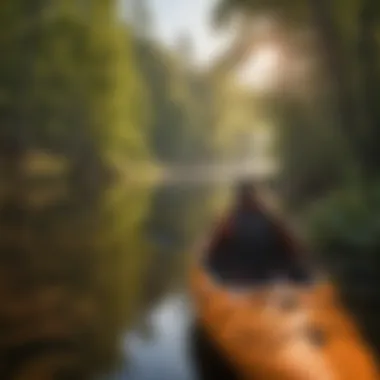Unlocking Michigan's Outdoor Adventures with the Recreation Passport


Intro
The focus of this article is twofold. First, it highlights the benefits provided by the Michigan Recreation Passport. Second, it discusses its impact on outdoor preservation. Navigating through these dimensions empowers readers with the essential information to engage responsibly with Michigan's outdoor resources.
Understanding Forestry Practices
Forestry practices in Michigan play a crucial role in managing the state's rich landscapes. The utilization of proper methodologies can enhance the health and productivity of forests.
Types of Forestry Practices
Various forestry practices are employed across Michigan:
- Sustainable forestry seeks to maintain ecological balance while meeting human needs.
- Selective cutting minimizes damage to surrounding trees and biodiversity.
- Clear-cutting is often criticized, yet it can temporarily boost certain wildlife populations.
Each method has its own significance depending on desired outcomes, ranging from improved timber production to wildlife habitat enhancement.
Historical Context
Historically, Michigan's forests faced exploitation due to urban expansion and industrialization. Early logging practices led to significant deforestation. An awareness of sustainable practices began in the 20th century, fueled by conservation movements. This change in philosophy underscored the value of maintaining forest ecosystems.
Today, understanding historical context is vital for professionals and academics. It helps to gauge the effectiveness of modern forestry techniques and their impact on biodiversity and climate.
Principles of Woodland Stewardship
Woodland stewardship involves managing forested lands to enhance their health and productivity over time. This principle is essential for any sustainable recreational practice.
Conservation Techniques
Conservation techniques are keys to effective management:
- Reforestation aids in restoring depleted areas to their original state.
- Controlled burns reduce excess biomass, promoting healthier forest regrowth.
- Habitat restoration seeks to repair ecosystems damaged by previous practices.
These methods, when applied appropriately, support the conservation of forest ecosystems.
Managing Forest Resources
Effective management entails monitoring forest health, understanding species interactions, and adapting to environmental changes. Continuous assessment ensures that resources are utilized without compromising future generations.
Sustainable Forest Management
Sustainable forest management integrates ecological, social, and economic values. It's an approach that seeks to provide long-term benefits to all stakeholdres, including the environment and the community.
Certification Standards
Certification standards, such as those from the Forest Stewardship Council (FSC), ensure that timber products are sourced from well-managed forests. Certification helps consumers make informed choices that support sustainability.
Economic Benefits of Sustainability
Investing in sustainable practices yields economic benefits. Healthier forests can offer greater yields of timber and non-timber products. Additionally, recreational opportunities can increase tourism revenue, benefiting local economies.
Prelude to the Michigan Recreation Passport
The Michigan Recreation Passport serves as a vital instrument for engaging with the state’s extensive natural landscapes. It opens up access to numerous recreational opportunities including state parks, trails, and other outdoor sites. Understanding this passport's significance not only enhances the outdoor experience but also contributes to local conservation efforts. The passport simplifies the process for visitors, encouraging more extensive participation in outdoor activities.
Understanding the Concept
At its core, the Michigan Recreation Passport is a simple concept designed to foster outdoor recreation and environmental stewardship. The passport allows residents and visitors to explore state-managed properties without the hassle of individual admission fees. Instead of paying for access to each park separately, holders gain entry to an array of venues with a single pass. This approach streamlines visitation and enhances the tourist experience while promoting the use of Michigan’s abundant natural resources.
The passport is more than just a ticket; it symbolizes a commitment to conserving Michigan's natural beauty. By purchasing the passport, individuals contribute directly to the upkeep and improvement of the parks and facilities they enjoy. This relationship between recreational users and preservation efforts creates a symbiotic dynamic that benefits both parties. Visitors can engage in hiking, camping, and birdwatching, among other activities, while knowing that their financial support is directly influencing conservation measures.


History and Evolution
The Michigan Recreation Passport began as part of a broader initiative to make outdoor access more democratized and appealing to the public. Initially, access to certain parks required separate fees, which limited participation among lower-income individuals. In response to this challenge, policymakers developed the passport as a solution.
The program has undergone several changes since its inception in 2010. It was designed to be customer-friendly while simultaneously addressing funding issues for parks that had suffered under budget cuts. Over the years, it has expanded to include not just state parks but also a variety of recreational lands such as historical sites and special nature preserves. The passport's flexibility reflects the state's commitment to diversifying the experiences available to residents and visitors alike.
Through these evolutions, the Recreation Passport has seen increased interest and uptake. It is seen not merely as a vehicle for entry but as a conduit for social engagement and environmental responsibility. As awareness of the benefits continues to grow, more Michiganders are likely to take advantage of this program, ensuring its significance for years to come.
The Michigan Recreation Passport plays a crucial role in balancing recreation with conservation, facilitating responsible enjoyment of the state's natural resources.
Key Features of the Recreation Passport
The Michigan Recreation Passport serves as a crucial tool for many outdoor enthusiasts and nature lovers. It not only supports the state’s natural resources but also enhances the experience of visitors. Below are the key features encompassing the passport's multifaceted benefits.
Accessing State Parks
One of the principal features of the Recreation Passport is the access it provides to Michigan’s extensive network of state parks. With this passport, individuals can enter over 100 parks across the state without paying separate entry fees. It simplifies the process of enjoying these landscapes, as the passport replaces the need for daily passes. For those who appreciate nature trails, camping facilities, and scenic views, possessing the passport is invaluable.
Access to these parks improves tourism and educational opportunities as park visitors can explore a variety of ecological settings. Moreover, the passport gives users the freedom to visit the parks multiple times throughout the year, fostering a deeper connection with Michigan’s natural world.
Discounted Rates for Activities
Another significant aspect of the Recreation Passport is its provision of discounted rates on various recreational activities. Holders of the passport may receive discounts on equipment rentals, educational programs, and even certain guided tours within state parks. This feature can significantly reduce the cost of engaging in outdoor experiences, making activities more accessible, especially for families or large groups.
Participants can engage in activities such as kayaking, hiking, or fishing with less financial burden, which promotes increased participation in outdoor recreational activities. Moreover, these discounts often encourage individuals to try new activities and explore unique features of different parks.
Support for Conservation Efforts
The Michigan Recreation Passport also plays a vital role in supporting conservation efforts across the state. A portion of the fee collected from passport sales is allocated directly to the management and conservation of Michigan’s natural resources. This funding aids in the maintenance of park facilities, restoration projects, and ecological protection initiatives.
By investing in the preservation of these natural spaces, the passport contributes to the sustainability of Michigan's ecosystems. Additionally, it fosters a sense of responsibility among users to respect and protect the environment while enjoying recreational activities. As more individuals engage with the outdoor resources, understanding their impact becomes integral to maintaining the health of these areas.
"The Michigan Recreation Passport encourages both exploration and appreciation of the state's natural landscapes, reinforcing the significance of sustainable engagement with our environment."
In summary, the key features of the Michigan Recreation Passport facilitate access to the state's parks, provide cost-effective opportunities for recreation, and underpin crucial conservation efforts. These attributes not only enhance the experience of users but also foster a collective responsibility towards preserving Michigan's natural environment.
Purchasing the Michigan Recreation Passport
The decision to purchase the Michigan Recreation Passport is central to enjoying the rich array of outdoor activities and spaces offered by the state. This passport is more than just a pass; it grants a direct connection to Michigan's state parks and recreational areas, fundamentally enhancing one's ability to engage with nature meaningfully and sustainably.
Where to Buy
Obtaining the Michigan Recreation Passport is a straightforward process. It can be purchased online through the Michigan Department of Natural Resources (MDNR) website. Alternatively, it is available at various physical locations, including state park entry points and local government offices. This flexibility in purchasing options ensures that anyone interested can access the passport with relative ease.
Some notable settings to buy the passport include:
- State park visitor centers
- Local DMV offices when renewing or applying for a vehicle registration
- The MDNR online portal, allowing for convenience and efficiency
Cost Implications and Discounts
The cost of the Michigan Recreation Passport is relatively modest, especially given the extensive benefits it provides. When the passport is added to a vehicle registration, the fee is often seen as an investment in both personal enjoyment and the conservation of the state's natural resources.
Specific discounts may apply in certain situations:
- Senior citizens receive reduced rates on passport purchases.
- Families may find bundled options that save money over individual purchases.
- Occasionally, promotional discounts may be offered during new initiatives aimed at encouraging more residents to utilize state parks.
Emphasizing cost-effectiveness remains vital. Those contemplating outdoor excursions often find that the cost of individual park fees may exceed the annual passport fee.
Online vs. In-Person Transactions
Both online and in-person transactions for the Michigan Recreation Passport offer distinct advantages. Online purchases provide convenience, especially for those who prefer to secure their passport ahead of planned trips. This method facilitates immediate access to the passport and allows for faster entry into parks.


In contrast, purchasing the passport in person can provide opportunities for engagement with staff who can offer personalized recommendations regarding state parks and activities. Individuals can also utilize this chance to gain insights into lesser-known recreational areas, enhancing their recreational experience.
Ultimately, the choice between online and in-person transactions depends on personal preference. Each brings its own set of advantages, making the process of acquiring the Michigan Recreation Passport as accommodating as possible.
Exploring Michigan’s State Parks
Exploring Michigan's State Parks is integral to understanding the true value of the Michigan Recreation Passport. These parks are not merely expanses of land; they serve as essential preserves of biodiversity, recreation, and cultural heritage. The Recreation Passport facilitates access to a diverse range of outdoor experiences. Engaging with these parks allows individuals to reconnect with nature, offering opportunities for rest and rejuvenation.
Overview of Protected Areas
Michigan's protected areas include a vast network of parks and natural settings, recognized for their ecological significance. Each park has unique features that contribute to Michigan's natural landscape. The parks range from vast forests and serene lakes to rugged coastlines.
By safeguarding these areas, the state ensures the preservation of ecosystems critical to wildlife and plant species. The Recreation Passport plays a pivotal role in supporting maintenance and conservation efforts, ensuring these protected areas remain accessible for generations.
Popular Destinations to Visit
Several destinations stand out in Michigan's park system:
- Sleeping Bear Dunes National Lakeshore: Known for its stunning dunes and views of Lake Michigan, it's a favorite for hikers and beachgoers.
- Pictured Rocks National Lakeshore: Features spectacular cliffs along Lake Superior, attracting photographers and outdoor adventurers.
- Raymond W. Schwartz Park: Offers opportunities for fishing and boating in a serene environment.
Visiting these sites enhances one's appreciation of Michigan's natural beauty. The Recreation Passport provides easy access, making it feasible for more people to explore these popular spots.
Hidden Gems Within the State
Beyond the popular sites, Michigan is home to hidden treasures that are lesser-known but equally remarkable:
- Allegheny National Forest: Offers secluded trails and pristine waters.
- Hartwick Pines State Park: Known for its old-growth forest and tranquil atmosphere, it provides a peaceful retreat.
- Porcupine Mountains Wilderness State Park: Features breathtaking waterfalls and rugged terrain, perfect for exploration.
These hidden gems offer visitors a chance to experience tranquility away from the crowds. Utilizing the Recreation Passport here allows for sustainable enjoyment of lesser-known areas, aligning recreation with conservation goals.
Maximizing Your Recreation Passport Experience
Maximizing the experience you can have with the Michigan Recreation Passport involves some thought and planning. The diverse offerings of Michigan's parks and recreational areas require visitors to adopt a strategic approach for a fulfilling engagement. From trip planning to choosing the right activities, understanding how to effectively use the passport can enhance your outdoor experiences while supporting conservation efforts. This section will explore practical strategies to help you leverage this valuable resource.
Planning Trips Effectively
Effective trip planning is crucial for anyone wishing to make the most out of their Recreation Passport. Knowing when to visit, what to pack, and which destinations suit your interests can transform a simple outing into an enriching experience.
Consider the time of year and weather conditions when planning your visits to state parks. For instance, late spring or early autumn can present ideal conditions for hiking due to moderate temperatures and less crowded trails. You should also check park events and activities that might enhance your visit, such as guided tours or educational workshops.
Having a clear itinerary is useful, but flexibility in your plans can often lead to unexpected adventures.
- Research Destinations: Use resources such as Wikipedia or state park websites for detailed information about the parks.
- Create a Check List: List must-haves based on the activities you plan to engage in, e.g., water gear for lake trips or hiking boots for nature trails.
Engaging in Outdoor Activities
Engaging in the wide array of outdoor activities available through the Michigan Recreation Passport can significantly enrich your time spent in nature. The passport offers access to various recreational options, including hiking, fishing, bird watching, and camping.
Each park has distinct features and opportunities. For instance, the Sleeping Bear Dunes National Lakeshore is celebrated for its breathtaking views and dune climbing, while Tahquamenon Falls State Park features stunning waterfalls and trails for every skill level.
Exploring these activities is not just a way to enjoy nature; it also supports the overall goal of conservation. By participating in outdoor activities, visitors raise awareness of environmental issues and the importance of maintaining these natural resources.
- Choose Activities Wisely: Not all parks might cater to each activity. If you love water sports, carefully select parks with lakes or rivers.
- Respect Nature: Follow all posted rules and guidelines to preserve the environment.
Utilizing Available Resources
To further enhance your experience, utilizing available resources is essential for any user of the Michigan Recreation Passport. Many tools are designed to help visitors get the most out of their adventures, and tapping into these resources requires awareness and initiative.
Local tourism websites, social media groups on Facebook, and outdoor forums such as Reddit can provide up-to-date information regarding park conditions and user experiences. Additionally, many parks offer visitor centers where helpful staff can provide maps, guides, and seasonal insights.
"The most effective way to engage with the outdoors is to take advantage of the knowledge and tools provided by parks and recreation communities."


Some practical resources include:
- Mobile Apps: Download apps that track park trails, weather, and activity guides.
- Park Newsletters: Sign up for newsletters to stay informed about events and changes in park operations.
- Guides and Brochures: Always pick up materials available within the parks.
By carefully planning trips, engaging with outdoor activities, and making good use of available resources, visitors can significantly enrich their experiences with the Michigan Recreation Passport, making each visit memorable and impactful.
Challenges and Considerations
Understanding the challenges and considerations related to the Michigan Recreation Passport is paramount for ensuring sustainable enjoyment of Michigan's abundant natural resources. Increased access to parks and recreational areas brings both opportunities and responsibilities. This section examines the environmental impacts of heightened visitor numbers and the necessity of balancing recreational pursuits with conservation efforts.
Environmental Impact of Increased Visitor Access
The influx of visitors to state parks can have significant environmental repercussions. As more people engage with these natural spaces, the stress on the ecosystem often escalates. Various factors contribute to this impact:
- Soil Erosion: High foot traffic can lead to soil compaction and erosion, degrading trails and challenging plant root systems.
- Wildlife Disruption: Increased noise and human activity can displace wildlife, affecting their natural behaviors and habitats.
- Waste Management Issues: Visitors may generate litter and other waste, straining park resources for waste management and cleanup.
"Sustainable tourism is about minimizing our footprint while maximizing enjoyment for all."
Addressing these impacts requires a multi-faceted approach. Encouraging visitors to adhere to Leave No Trace principles can help mitigate their environmental footprint. Park management might also consider implementing measures like designated paths to minimize damage and creating educational programs that promote responsible behavior.
Balancing Recreation and Conservation
The harmony between recreation and conservation is crucial. While the Michigan Recreation Passport provides access to parks and recreational activities, it’s imperative to maintain the integrity of these natural landscapes. Some key considerations include:
- Resource Allocation: Funds generated from the sales of Recreation Passports should be strategically allocated towards conservation initiatives and maintenance of park infrastructure.
- Visitor Education: Educating visitors on local flora and fauna not only enhances their experience but also promotes an understanding of the importance of preserving these ecosystems.
- Monitoring Programs: Implementing monitoring systems can help track the changes in park environments, enabling better management practices and resource allocation.
By focusing on these considerations, the Michigan Recreation Passport can serve not only as a tool for recreation but also as a vehicle for responsible environmental stewardship. Ensuring that both recreational enjoyment and conservation efforts are prioritized will create a sustainable framework for future generations to engage with Michigan's natural beauty.
Future of the Recreation Passport Program
The future of the Michigan Recreation Passport program holds substantial significance for enhancing recreational engagement in the state. As people look for more opportunities to interact with natural landscapes, the program must adapt to changing needs and preferences. This involves not only increasing access to parks but also ensuring that the benefits of the passport are maximized for all users.
One key element is the ability of the program to evolve based on user feedback. This is essential for identifying areas of improvement and making adjustments that align with community interests. As the popularity of outdoor activities continues to soar, it becomes crucial to tailor the experience. By incorporating suggestions from visitors, the program can enhance its offerings, making outdoor engagement more appealing and accessible.
The passport can also harness the power of technology to connect with a broader audience. Implementing a mobile application would allow users to track their visits, discover new parks, and engage with educational content about conservation efforts. In doing so, it opens avenues for fostering a deeper connection with Michigan's natural resources.
Furthermore, by collaborating with local businesses and organizations, the passport program can create mutually beneficial partnerships. This strategy not only supports the local economy but also introduces passport holders to a variety of recreational activities, enhancing their experience.
Evolving Strategies for Engagement
The strategies for engaging with the Recreation Passport are essential for resonating with a diverse audience. One approach could be hosting events that align with outdoor activities. For instance, organizing guided tours, nature festivals, or clean-up initiatives encourages community participation. These events foster not only a sense of community but also awareness of the importance of conservation.
Moreover, incorporating educational programs is vital. Workshops on responsible outdoor practices can help instill values that align with sustainable use of natural areas. This could empower visitors to take an active role in preserving the landscapes they enjoy.
Potential Expansions and Improvements
Looking ahead, the Recreation Passport program has room for various expansions and improvements. One possible expansion could involve increasing the scope of the passport to cover additional recreational sites beyond state parks, such as historical sites and wildlife habitats. This would broaden the appeal and encourage exploration of Michigan’s rich cultural and natural heritage.
Another important aspect is the potential for financial sustainability. As tourism increases, the revenue generated from the passport can fund improvements in park facilities and conservation efforts. Allocating funds transparently will build trust among users, showing them the tangible benefits of their support.
"Investing in recreation today means preserving Michigan's natural beauty for future generations."
Ending
The Michigan Recreation Passport serves an essential function by facilitating access to the vast outdoor resources that the state has to offer. The significance of this topic cannot be understated as it directly relates to the promotion of recreational activities while also ensuring the sustainability of Michigan's natural landscapes.
Reinforcing the Value of Recreation
Engaging with Michigan’s outdoor environments is not just about leisure. It is about appreciation and protection of these spaces. The Recreation Passport enhances the experience of visitors by providing affordable entry into state parks and recreational sites. This access fosters a deeper understanding of local ecosystems and encourages conservation efforts among those who use these sites.
Moreover, the passport serves a dual purpose. It generates revenue that directly supports the maintenance of parks and conservation initiatives. The funds raised contribute to improving facilities, preserving landscapes, and ensuring that future generations can enjoy these natural wonders. By utilizing the Recreation Passport, individuals become part of a larger community that values and invests in protecting natural resources.
Encouragement to Utilize Local Resources
Utilizing local resources through the Recreation Passport is imperative for two main reasons. First, it promotes community engagement. By exploring nearby parks and facilities, citizens can forge connections with their environment and neighbors. Increased local tourism also supports regional economies, ensuring that the benefits from outdoor recreation are felt within communities.
Second, exploring local resources contributes to responsible stewardship of Michigan's landscapes. It enhances awareness about the importance of conservation and the challenges that come with increased recreational use. When individuals are encouraged to visit their local parks, they are not only enjoying their surroundings but also becoming informed advocates for sustaining these resources. Readers are thus prompted to explore parks like Belle Isle Park or Porcupine Mountains Wilderness State Park. These places can reshape the relationship individuals have with their local environment.







